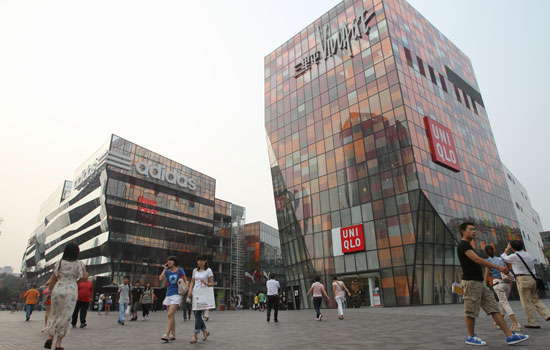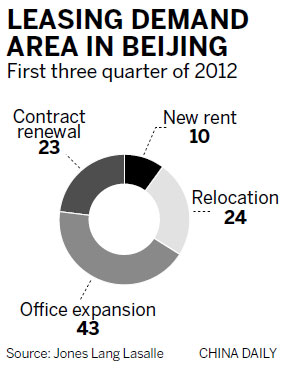Beijing offices still hot properties
Updated: 2012-10-16 09:40
By Hu Yuanyuan (China Daily)
|
|||||||||||
Rents set to grow 20% this year despite economic slowdown
|
 |
|
Sanlitun Village, an office and shopping complex in Beijing. [Photo/ China Daily] |
The cost of renting Grade A office space in Beijing is expected to increase by 20 percent this year despite the slowdown in China's economic growth, leading more companies to move their offices, the international real estate consultancy company Jones Lang LaSalle said in a report on Monday.
"Although the rate of increase has slowed below last year's 41 percent, some resistance from price-sensitive tenants to the high rents in Beijing is now being felt," said Qin Xiaomei, chief researcher at Jones Lang LaSalle Beijing.
 |
A number of tenants, struggling in the current economy, handed back space to the market this quarter and this may be a recurring theme over the coming quarters as companies' expansion plans are affected by the slowing economy.
Monthly rents increased to 341 yuan ($52.5) per square meter, based on gross floor area, by the end of the third quarter, up 4.7 percent from the previous quarter, according to JLL's research.
"Most of these enterprises are in the manufacturing, IT and electronic products sectors," Qin said.
Despite the slowdown in demand in the first three quarters of the year, the vacancy rate in Beijing's Grade A office market continued trending downward, reaching 5.7 percent, a 12-year low, by the end of the third quarter of this year, according to JLL.
Eric Hirsch, head of markets at JLL in Beijing, said low vacancy rates and rising rents, albeit at a slower pace, mean that some tenants are making better use of space and exploring alternative options to meet their space and budget requirements.
"This is a trend that we expect to continue into 2013."
However, a number of companies from the financial, automobile manufacturing and energy sectors were leasing space this quarter.
Demand is expected to be largely stable in the fourth quarter as some multinational companies continue to expand, although the net take-up for the whole year is expected to be only around a third of the 2011 figure, according to the report.
"We expect the rental growth to continue to slow and stabilize as the domestic economic slowdown and global economic uncertainty continue to affect the Beijing Grade A office market," said Qin.
Nevertheless, the increase in rents in Beijing has been stronger compared with what has happened in some other large Chinese cities.
In the year to date, rents in Beijing's CBD increased by 20.4 percent. During the same period in Shanghai, they increased by only 2.8 percent. Hong Kong saw a decrease, according to JLL.
Domestic buyers have dominated the en bloc transaction market in 2012. Ping An Trust purchased Tower B of China Electronic Plaza in the third quarter for 1.6 billion yuan.
And Qihoo 360 Technology Co Ltd announced that its subsidiaries recently entered into definitive agreements with a subsidiary of Beijing Electronic Zone Investment and Development Co Ltd to purchase 69,205 square meters of new office premises in Chaoyang district for 1.38 billion yuan.
Local and self-use buyers will be the main drivers in the office investment market and overseas investors with strong financial backgrounds and advanced operational experience will pay more attention to the retail market.
"Global economic uncertainty and a lack of assets fitting the typical foreign investor criteria mean that international investors have been inactive in recent quarters," said David Hand, China Investment head at JLL.
huyuanyuan@chinadaily.com.cn
Today's Top News
President Xi confident in recovery from quake
H7N9 update: 104 cases, 21 deaths
Telecom workers restore links
Coal mine blast kills 18 in Jilin
Intl scholarship puts China on the map
More bird flu patients discharged
Gold loses sheen, but still a safe bet
US 'turns blind eye to human rights'
Hot Topics
Lunar probe , China growth forecasts, Emission rules get tougher, China seen through 'colored lens', International board,
Editor's Picks

|

|

|

|

|

|





